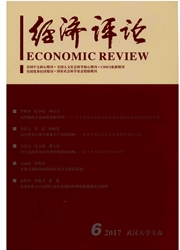

 中文摘要:
中文摘要:
工业品多样性消费的偏好、公共品享用的便利,以及对服务品多样性与多层次性的需求是居民向城市集聚的三个重要动力,相对于前两个因素,服务业与城市集聚力关系的研究还比较少。基于此,本文建立服务业发展对城市集聚影响机制的空间模型,在研究服务业发展对城市集聚影响机制的同时,使用数值模拟、面板门限回归的方法对研究结果进行了验证。研究表明:服务业发展对城市集聚的影响机制是通过居民对服务品多样性和多层次性的偏好实现的;服务业发展能够提升城市集聚力,但具有显著的门槛效应:当服务业相对效率、居民服务品消费比重以及收入水平较高时,服务业发展对城市集聚有显著的正效应;相反,当三者较低时,贸然鼓励服务业发展则会阻碍城市经济的集聚。
 英文摘要:
英文摘要:
he preference to diversity of industrial product,convenience of enjoying public goods,and the demand for diverse and multi-level services are three main forces which drive residents to the urban.Existing research about the relation between service industry and urban agglomeration is less compared with the former two factors.This paper builds a space model about how service industry influences urban agglomeration based on these conditions.At the same time,this paper uses numerical simulation and panel threshold regression to test the theory conclusion.The results show:the influence mechanism of service industry development on urban agglomeration is achieved through residents' preference to multi-level and diverse service;the development of service industry can raise the urban agglomeration force.However,this influence has a threshold effect;when the relative productivity of service is higher,the consumption ratio of service is higher,or the income of residents is higher,the development of service industry has a significant positive effect on urban agglomeration;on the contrary,when the relative productivity of service is lower,the consumption ratio of service is lower,or the income of residents is lower,rashly encouraging service may hinder the urban agglomeration.
 同期刊论文项目
同期刊论文项目
 同项目期刊论文
同项目期刊论文
 期刊信息
期刊信息
